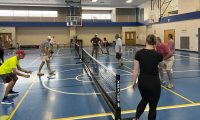For Anna Lonon, founder of The Lonon Foundation, the experience behind the nonprofit’s creation was deeply personal. She and her first husband Mike were college sweethearts who met at the University of South Carolina and moved to Charleston after graduation to launch their careers and build a life together. Mike worked as an engineer and Lonon taught English at the College of Charleston.
Those plans were unexpectedly derailed when at age 29, Mike was diagnosed with head and neck cancer. Their son, Jack, was 1 at the time of the diagnosis. Mike fought valiantly for three years but succumbed to the disease on April 7, 2014, when Jack was 4. By this time, they also had a 3-month-old baby, Harker.
Lonon described Mike as a thoughtful and kind person, and they would often have conversations while he was sick about how daunting the experience was financially, emotionally and physically, particularly while trying to balance this life-altering diagnosis with the demands of having a young family and a new career.
“He would say, ‘if it’s so hard for us, can you imagine what it would be like for folks that have worse insurance or less stable incomes?’ He was always thinking about other people,” recalled Lonon.
When Mike passed, Lonon desired to give back in his memory and she worked for a year in the Head and Neck Cancer Alliance’s communications department.
“I still wanted to give back, but after a year in that position I just knew I couldn’t do it anymore. It was just too close, too raw, too much,” reflected Lonon. “I wanted to do something that was hopeful and that would focus on empowering people. I knew I wanted to do something for children, mine and others.”
That was the impetus for establishing The Lonon Foundation in 2016, a nonprofit that helps children who have been impacted by a parent or caregiver’s cancer diagnosis find comfort, heal and grow from their shared experiences. The first fundraising event the Foundation held was the Hike for Mike (Mike was an avid hiker) which raised $5,000.
In 2017, at the recommendation of Mike’s former palliative-care social worker, they started offering monthly events and launched the Uplift program, which provides year-round support to families of kids ages 5-17 who have a parent or caregiver with cancer. Events are scheduled from August-May.
Child Life Specialist Katie Myers develops the Uplift curriculum, runs the events and coordinates with newly-diagnosed families to assess their individualized needs. She also furnishes ongoing support and puts families in contact with other resources as necessary to access essentials such as food and additional therapy. When Myers initially reaches out, she sends a welcome box curated for that family with age-appropriate books and play-based activities.
Besides Uplift, The Lonon Foundation distributes financial assistance mini grants for addressing needs like food and clothing or to help a child with additional grief counseling or therapy. They also supply Family Resource Kits, a bag filled with play items like pinwheels, Play-Doh and stress balls, along with a guide on how to talk to your child about your cancer diagnosis and ways to support children based on their developmental age.
Lonon explained that “providing psychoeducational support is important because it empowers the parents on ways to talk to their children during this difficult life event.”
She further noted that parental illness is considered an adverse childhood experience (potentially traumatic event).
“By providing age-appropriate information, we can help mitigate the emotional issues that can arise from this experience for a child,” Lonon said.
To offer families assistance though they need funding. They will be hosting their biggest fundraising event, the 2nd Annual Shuckfest oyster roast, Nov. 3 from 1:00 p.m. until 4:00 p.m.- at the IOP Exchange Club. It will include oysters, BBQ from Swig and Swine, an auction, live music and alcohol for purchase. All proceeds go to support Foundation programming.
They also offer myriad volunteer opportunities. Current needs include a bilingual volunteer who speaks Spanish and English, volunteers to do outreach in schools and raise awareness of their services, people to work information booths at events, adult volunteers to help with marketing and social media and individuals to assemble Family Resource Kits.
Volunteers are particularly valuable for The Lonon Foundation since Lonon juggles running the nonprofit with her full-time job as a communications specialist for an open source
software company.
Lonon emphasized that the Foundation addresses a need and a gap in cancer support. The American Cancer Society reported that adults under age 50 were the only one of the three age groups (the others being 50-64 and 65 and older) with an increase in overall cancer incidence from 1995 to 2020. These are people having children and starting families.
“Children are resilient, but you have to provide them with the coping and resilience tools to be resilient. It’s not some innate thing,” asserted Lonon. “These children need support. Giving them the tools they need can help them through this stressful experience and possibly throughout their life.”
Research further shows that multiple traumatic events in a child’s life can lead to a higher risk of developing future issues like alcoholism, diabetes, cancer and obesity.
“It’s so important to us because it’s not just about the child now,” underscored Lonon. “It’s about how it affects the child long-term.”
For more information, visit TheLononFoundation.org.
By Colin McCandless







